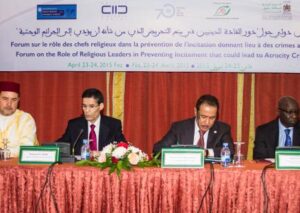
Photo Credit: KAICIID
Last month, the United Nations Office on Genocide Prevention co-convened the “Forum on the Role of Religious Leaders in Preventing Incitement that could Lead to Atrocity Crimes.” The major outcome from the forum was a “Plan of Action for the Prevention of Incitement to Violence that could lead to Atrocity Crimes.” The Plan of Action is a draft document that will be revised and finalized during five regional meetings set to take place during the next year; and a “Declaration will be adopted at a plenary meeting of religious leaders” in 2016.
Eight major areas of consideration were highlighted in the plan – many of which are already being done by Tanenbaum and our Peacemakers: 1) “Monitoring” incitement to violence that could lead to atrocity crimes; 2) Developing, speaking out, and circulating “alternative” messages to counter incitement and hate speech (Tanenbaum Peacemakers do this!); 3) Engaging in dialogue with the speakers and the potential audience; 4) Developing and revising education, curricula and capacity building (Tanenbaum’s education program does this!); 5) Engaging in or strengthening inter-religious and intra-religious dialogue and activities; 6) Engaging in dialogue on grievances; 7) Strengthening clarity of thinking and of message (Tanenbaum is a thought leader on the issues that fuel extremism); and 8) Engaging with political leaders (Tanenbaum Peacemakers often do this).
The Plan of Action also referenced several additional focal points , including the “mapping and networking of religious leaders who actively work to prevent or counter incitement that can lead to atrocity crimes around the world.” At Tanenbaum, we believe the UN and its partners have a model to reference and further explore in Tanenbaum’s Peacemakers in Action Network. Why not start where successes are happening – by learning about the religious Peacemakers already in action and having a powerful impact as they work together around the globe?
For well over fifteen years, Tanenbaum has identified religiously motivated Peacemakers working in areas of armed conflict, whose lives and liberty have been at risk in pursuit of peace. Thirty courageous Peacemakers with diverse experiences of conflict from 23 countries have been recognized for their peace work with the Peacemakers in Action Award. Convened every two years to share knowledge, successful practices and the common bond of their faith-driven work, the Peacemakers formalized their Network in 2011.
As a Network facilitated by Tanenbaum, the Peacemakers communicate regularly and even travel to each other’s homelands to work together to help build peace. Later this month, two Nigerian Peacemakers, Pastor James Wuye and Imam Muhammad Ashafa, will join their fellow Peacemaker, Dishani Jayaweera, in Sri Lanka to train religious leaders from different faith traditions (Buddhism, Hinduism, Islam and Christianity). Already well-known in Sri Lanka for their work in Kaduna state, Pastor James and Imam Ashafa will serve as inspirations, models and experienced Peacemakers to Sri Lankans hoping to bring lasting peace to a country still recovering from a decades-old conflict.
As the United Nations Office on Genocide Prevention smartly prepares to utilize a resource – religious leaders/actors – sorely underutilized in creating the conditions for a more peaceful world, Adama Dieng, UN Special Adviser on the Prevention of Genocide, should strongly consider the Peacemakers in Action Network as a model for its efforts to map and network religious actors actively working to prevent or counter incitement that can lead to atrocity crimes around the world.